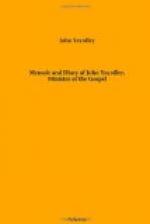After attending the Leeds Quarterly Meeting in the Third Month, they returned to their home at Scarborough, but soon left it again to be present at the Yearly Meeting in London. The Society of Friends began about this time to be agitated by differences of opinion, chiefly on points of doctrine. John Yeardley not only kept himself sedulously free from the spirit of party, but, whether from a natural aversion to public life, or from the fear of exceeding the limit of his own calling and abilities, he abstained from taking a prominent position, and left it very much to others to sway the affairs of the Church. But he was not unmindful of the dangers by which the Society was assailed, and he bent the force of his mental vigor and Christian experience towards the promotion of individual growth in grace and faithfulness to the divine call, and the diffusion of clear and comprehensive views of Scriptural truth; and when the hour came for sympathising with those who were harassed by doubts, or such as were subjected to trial by the effect of religious dissension, he was ready, with his beloved partner, to share the burden of the afflicted, to probe the wounds of those who had been bruised, and to pour in the oil of heavenly consolation.
His note regarding the Yearly Meeting is short:—
The business was of a most important nature, and sometimes very trying. We had strong proof that many spirits professing to have made long progress in the Christian life were not enough subdued by the humbling power of divine grace; but through all, I trust, our heavenly Father dealt with us in mercy, and sent help and wisdom to direct and strengthen his poor tribulated children.
On returning to Scarborough, he writes:—
I humbly trust our hearts are truly grateful to the Author of all our mercies, who has granted us once more a little rest of body and sweet peace of mind; but, as it regards myself, I must say that inward poverty has prevailed more since my return home than it has done for the last two years of absence. It is well to know how to suffer want, as well as to abound.
Want of occupation was not one of John Yeardley’s trials, even when “standing,” as he expressed it, “free from any prospect of immediate service, and feeling much as a vessel not likely to be brought into use again.” Scriptural inquiry, the study of languages, and of the history of the Church, watching the progress of religious light and liberty on the Continent of Europe, his garden, the binding of his books—these were the employments of his industrious leisure. To these must be added the time bestowed on several small publications from his own and his wife’s pen (the latter chiefly poetical), of which the “Eastern Customs,” a volume which was the product of their united labor, and the materials for which were supplied by their journey to Greece, is the best known.




